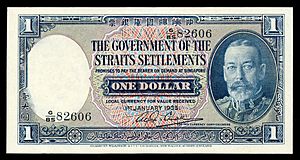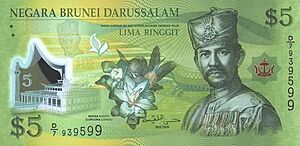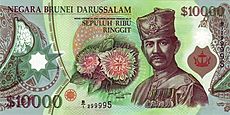Brunei dollar facts for kids
Quick facts for kids Brunei dollar |
|||||
|---|---|---|---|---|---|
|
|||||
| ISO 4217 Code | BND | ||||
| User(s) | |||||
| Inflation | 0.2% as of 2017 | ||||
| Pegged with | Singapore dollar at par | ||||
| Subunit | |||||
| 1⁄100 | sen | ||||
| Symbol | $, B$ | ||||
| Coins | |||||
| Freq. used | 5, 10, 20, 50 sen | ||||
| Rarely used | 1 sen | ||||
| Banknotes | |||||
| Freq. used | $1, $5, $10, $50, $100 | ||||
| Rarely used | $20, $25, $500, $1000, $10,000 | ||||
The Brunei dollar (sign: B$) is the official money of Brunei. It has been used in Brunei since 1967. You might see it written as $ or B$ to show it's different from other types of dollars. One Brunei dollar is made up of 100 sen, which is like 100 cents. The Brunei Darussalam Central Bank is in charge of printing and issuing the Brunei dollar.
A special agreement from 1967 means the Brunei dollar and the Singapore dollar have the same value. This means you can often use Brunei dollars in Singapore, and Singapore dollars in Brunei. It's like they're two sides of the same coin!
History of Brunei's Money
Before the Brunei dollar, people in Brunei used many different things as money.
Early Forms of Money
Long ago, people in Brunei used cowrie shells as money. Brunei was also known for its bronze teapots. These teapots were sometimes used to trade goods along the coast of northern Borneo.
From the 1500s to the 1800s, the Spanish-American silver dollar was widely used for trade. These coins came from ships called Manila galleons. The Straits dollar from the 1800s also came from these Spanish coins.
In 1868, Brunei started making its own tin coins called pitis. Later, in 1888, a one-cent coin was introduced. This cent was worth one hundredth of a Straits dollar.
Money Under British Rule
In the early 1900s, Brunei was a protectorate of Britain. During this time, Brunei used money from other British areas.
- From 1906, they used the Straits dollar.
- In 1939, this changed to the Malayan dollar.
- From 1953 until 1967, they used the Malaya and British Borneo dollar.
Finally, in 1967, Brunei started issuing its very own currency, the Brunei dollar.
The Brunei Dollar Today
The Brunei dollar took the place of the Malaya and British Borneo dollar in 1967. This happened after Malaysia was formed and Singapore became independent. Until 1973, the Malaysian ringgit, Singapore dollar, and Brunei dollar all had the same value.
However, in 1973, Malaysia left this agreement. But the Monetary Authority of Singapore and Brunei's money board still keep their currencies interchangeable. This means the Brunei dollar is still accepted in Singapore, even if it's not their official money.
Old Coins Used in Brunei
Coins have been used in Brunei since the 900s. The Straits dollar was also used there from 1906.
Because Brunei had strong ties with China, the first coins used were Chinese. These were first called 'Pitis'. Later, when local 'Pitis' coins were made, the Chinese coins were called 'Kue'. The local 'Pitis' coins had 'Sultanate of Brunei' on the front and a royal umbrella on the back. These were used from the 1500s to the 1800s.
Another interesting coin was 'Duit besi', which means 'Iron money'. Iron was very valuable back then. One hundred small square pieces of iron were worth one dollar.
The last coin used before the Straits Settlements currency was the 'Duit Bintang', or 'Star coin'. It had a star on it and was made of copper in England in 1887. When the Straits Settlements currency arrived, these older coins were slowly taken out of use.
Before 1984, the Royal Mint in the United Kingdom made Brunei's coins. In 1984, the Brunei Darussalam Central Bank ordered coins from the Singapore Mint. These included 1-cent bronze coins and 5, 10, 20, and 50-cent cupro-nickel coins. The 50-cent coin even had special security features on its edge!
History of Banknotes in Brunei
The Straits dollar banknotes were introduced in Brunei in 1906. Then came the Malayan dollar in 1939, which replaced the Straits dollar at the same value. The Malayan dollar was issued by a special currency board. This board stopped issuing money during World War II when Japan invaded. The Malayan dollar notes had a picture of King George VI on them.
In 1952, the currency board changed its name. In 1953, it started issuing notes called the Malaya and British Borneo dollar to several areas, including Brunei.
In 1967, the Malaya and British Borneo dollar was replaced by three new currencies: the Malaysian dollar, Singapore dollar, and the Brunei dollar. All three had the same value at first. But in 1973, Malaysia left this agreement. The Singapore dollar and Brunei dollar, however, are still interchangeable today.
Brunei Coins Today
In 1967, Brunei introduced coins in values of 1, 5, 10, 20, and 50 cents. The 1-cent coin was made of bronze, and the others were made of cupro-nickel.
In 1986, the 1-cent coin started being made from copper-clad steel. Later, in 2008, the 1-cent coins changed again to brass.
Brunei Banknotes Today
On June 12, 1967, the Brunei government introduced banknotes in values of 1, 5, 10, 50, and 100 dollars. Notes for 500 and 1,000 dollars came out in 1979. In 1989, the name on the money changed to Negara Brunei Darussalam, which is the official name of the country. That same year, 10,000 dollar notes were introduced.
All notes show the value in Malay (using both Rumi and Jawi script) and in English. The English value used to be on the front, but now it's on the back with the Jawi script.
Brunei has issued five different series of banknotes. The colors of the $1, $5, and $10 notes have stayed the same across all series.
1967 Banknote Series
The first series of banknotes came out in 1967. They featured a picture of Omar Ali Saifuddin III, who was the 28th ruler of Brunei.
- $1 – blue
- $5 – green
- $10 – red
- $50 – brown
- $100 – purple
1972 Banknote Series
The second series was similar to the first. But the picture of Sultan Omar Ali Saifuddin was replaced with a portrait of Hassanal Bolkiah, the 29th and current ruler of Brunei. All banknotes since then have featured Sultan Hassanal Bolkiah. In 1979, two new higher values were added:
- $1 to $100 notes were like the 1967 series
- $500 – pink
- $1,000 – yellow
1989 Banknote Series
This was the third series, released after Brunei became fully independent. These notes were slowly replaced by the fourth series.
- $1 – blue
- $5 – green
- $10 – red
- $50 – brown, green, orange
- $100 – purple
- $500 – orange
- $1,000 – red-violet, purple, olive
- $10,000 – green, orange
1996–2000 Polymer and Paper Series
The fourth series (1996–2000) included both paper and polymer notes. Most of the paper notes from this series are no longer printed.
| 1996 Polymer and Paper Notes | |||||||||||
|---|---|---|---|---|---|---|---|---|---|---|---|
| Image | Value | Dimensions | Main Colour | Description | Date of issue | Issue suspended | Date of withdrawal | Material | |||
| Obverse | Reverse | Obverse | Reverse | Window / Watermark | |||||||
| $1 | 141 x 69 mm | Blue | Sultan Hassanal Bolkiah | Rainforest Waterfall | Coat of Arms of Brunei (Transparent window) |
1996 | 2011 | Current | Polymer | ||
| $5 | Green | Rainforest Floor | |||||||||
| $10 | Red | Rainforest Canopy | |||||||||
| $50 | 158 x 75 mm | Brown, Green and Blue | Oil Rig | Sultan Hassanal Bolkiah (Watermark) |
1996 | 2006 | Paper | ||||
| [1] | $100 | Brown, Orange | Brunei International Airport | ||||||||
| [2] | [3] | $500 | 175 x 81 mm | Orange | Royal Regalia Building | 2000 | |||||
| For table standards, see the banknote specification table. | |||||||||||
2004–2007 Polymer Series
Polymer banknotes were introduced from 2004 because there were many fake banknotes. All notes in this series are made of polymer plastic. The $100 note from this series even won an award for its cool security features in Australia in 2005!
| 2004–2007 Polymer Notes | |||||||||
|---|---|---|---|---|---|---|---|---|---|
| Value | Dimensions | Main Colour | Description | Date of | |||||
| Obverse | Reverse | Transparent Window | printing | issue | issue suspended | withdrawal | |||
| $50 | 158 x 75 mm | Light Blue and Bronze | Sultan Hassanal Bolkiah | Rainforest Bushes | Various different flora of Brunei | 15 July 2004 Hassanal Bolkiah's 58th birthday |
Current | Current | |
| $100 | Brown and orange | Chermin Island | |||||||
| $500 | 175 x 81 mm | Pink | Sultan Omar Ali Saifuddien III (1914–1986) | The Sultan Omar Ali Saifuddien Mosque and the Sultan Haji Hassanal Bolkiah Foundation Building (Yayasan) | 2006 | 28 December 2006 | |||
| $1,000 | 182 x 84 mm | Grey and Brown | Sultan Hassanal Bolkiah | The Ministry of Finance Building in Bandar Seri Begawan | 21 June 2007 | ||||
| $10,000 | 180 x 90 mm | Gold and Green | The Legislative Council (Parliament) Building in Bandar Seri Begawan | 28 December 2006 | 6 November 2020 | Gradually withdraw from circulation | |||
| For table standards, see the banknote specification table. | |||||||||
The B$10,000 note is one of the most valuable banknotes in the world that is still used! It's worth a lot more than many other countries' highest notes. However, since November 6, 2020, Brunei has stopped printing these B$10,000 notes. They are slowly taking them out of circulation to help prevent money laundering.
2011 Polymer Series
This series of polymer notes was released in 2011.
| 2004–2007 Polymer Notes | |||||||||
|---|---|---|---|---|---|---|---|---|---|
| Value | Dimensions | Main Colour | Description | Date of | |||||
| Obverse | Reverse | Transparent Window | printing | issue | |||||
| $1 | blue | Sultan Hassanal Bolkiah | Sultan Omar Ali Saifuddien mosque and the ceremonial barge | 2011 | |||||
| $5 | green and yellow | ||||||||
| $10 | red, yellow and brown | ||||||||
| For table standards, see the banknote specification table. | |||||||||
- $1 – blue (2011)
- $5 – green and yellow (2011)
- $10 – red, yellow and brown (2011)
These notes were made to celebrate Sultan Hassanal Bolkiah's 65th birthday. Interestingly, the Braille dots on these new notes were not raised enough for blind people to feel them properly.
Special Commemorative Banknotes
Sometimes, special banknotes are made to celebrate important events.
- $25 – purple and beige (1992)
- This note was made for the 25th anniversary of Sultan Hassanal Bolkiah becoming ruler.
- $20 – yellow (polymer, 2007)
- In 2007, Singapore and Brunei celebrated 40 years of their Currency Interchangeability Agreement. They both issued special $20 notes.
- The notes were yellow and made of polymer. They looked very similar, but the Brunei version had its state title in Jawi script, while Singapore's had it in Latin script.
- There was even a limited edition set with both versions in a folder, having matching serial numbers!
- $50 - yellow (polymer, 2017)
- In 2017, both Brunei and Singapore issued $50 polymer notes to celebrate the 50th Anniversary of their Currency Interchangeability Agreement.
- Also in 2017, Brunei issued another $50 polymer banknote (and a 50-cent coin) to celebrate Sultan Hassanal Bolkiah's 50th year on the throne. This note shows the Sultan's coronation and a portrait of him. It has a cool security feature called "spark live" ink.
| Current BND exchange rates | |
|---|---|
| From Google Finance: | AUD CAD CHF EUR GBP HKD JPY USD IDR MYR |
| From Yahoo! Finance: | AUD CAD CHF EUR GBP HKD JPY USD IDR MYR |
| From XE.com: | AUD CAD CHF EUR GBP HKD JPY USD IDR MYR |
| From OANDA: | AUD CAD CHF EUR GBP HKD JPY USD IDR MYR |
| From fxtop.com: | AUD CAD CHF EUR GBP HKD JPY USD IDR MYR |
See also
- Economy of Brunei
- Brunei pitis
 | Aaron Henry |
 | T. R. M. Howard |
 | Jesse Jackson |






